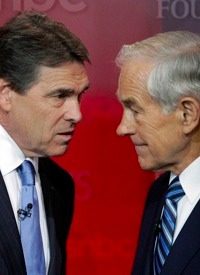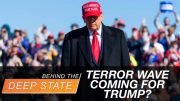
Perry took numerous vague barbs from just about all the other candidates in his first debate as a presidential candidate, but Ron Paul got specific. Asked if Perry was "less conservative than meets the eye," Paul responded: "Much more so. Just take the HPV. Forcing 12-year-old girls to take an inoculation to prevent a sexually transmitted disease, this is not good medicine, I do not believe. It's not good social policy."
Paul then proceeded to criticize sharply the method by which Perry created the mandatory vaccines of thousands of Texas pre-teens: "But one of the worst parts about that is the way it was done. The governorship in the State of Texas traditionally, is supposed to be a weak governorship. I didn't even know they could pass laws by writing an executive order. He did it with an executive order. Passed it. But the state was furious. And the legislature overwhelmingly repealed this. But I think it was the way it was passed — which was so bad, I think it's such a bad piece of legislation — but I don't like the idea of executive orders. I as President will not use executive orders to write laws."
Perry acknowledged that he created the order by executive fiat, ignoring the Texas legislature: "There was an opt-out in that piece of … it wasn't legislation it was an executive order," Perry responded. Then he added: "Should we have talked to the legislature first before we did it? Probably so. But at the end of the day, I will always err on the side of saving lives."
Another sharp exchange between the two took place over the namesake of the debate location: Ronald Reagan. The Paul campaign aired a television commercial nationally during the debate entitled "Trust." The campaign aid highlighted Ron Paul's early endorsement of Ronald Reagan's presidential campaign (he was one of only four congressmen to endorse Reagan in 1976) and Rick Perry's endorsement of Al Gore's presidential campaign in 1988. The ad concludes with the following statement:
After Reagan, Al Gore ran for President, pledging to raise taxes and increase spending, pushing his liberal values. And Al Gore found a cheerleader in Texas named Rick Perry. Rick Perry helped lead Al Gore's campaign to undo the Reagan revolution, fighting to elect Al Gore President of the United States. Now, America must decide who to trust: Al Gore's Texas cheerleader or the one who stood with Reagan.
{youtube width="500" height="308"}CtDBp1OrCwI{/youtube}
Ron Paul followed his campaign's television ad up with a critique of Perry tying the former Democrat even more tightly to the liberal Clinton-Gore administration: "The Governor of Texas criticized the governor of Massachusetts for Romneycare, but he wrote a really fancy letter supporting Hillarycare."
Rick Perry responded: "I was the Agriculture Commissioner at that particular point in time. We had no idea it was going to be the monstrosity that's known as Hillarycare." Perry has responded to critiques like this in similar fashion in recent weeks. And MSNBC.com reported August 31 that something is amiss with Perry's storyline: "It is true that the precise details of the plan were unclear at the time and the process of hashing out the policy was (now infamously) opaque. But some of the broad goals of the legislation were being reported at the same time Perry was penning praise to Clinton."
Perry immediately counter-attacked Paul, reminding the audience that Paul had briefly left the Republican Party at the end of the Reagan presidency to run for President in 1988 as a Libertarian. "Speaking of letters, I was more interested in the one that you wrote to Ronald Reagan back … and said I'm going to quit the party because of the things that you believe in."
Paul, given 30 seconds to reply to Perry, responded: "I strongly supported Ronald Reagan. I was one of four in Texas, one of the four members of Congress that supported him in 1976. And I supported him all along. And I supported all his issues and all his programs. But in the 1980s, we spent too much, we taxed too much, we built up our deficits and it was a bad scene. Therefore, I support the message of Ronald Reagan. The message was great. But the consequence — we have to be honest with ourselves — it was not all that great. Huge deficits during the 1980s. And that is what my criticism was for, not for Ronald Reagan's message. His message was a great message." Ron Paul didn't mention it, but he was also the only presidential candidate on that California stage to have been endorsed for election by Reagan.
With a quadruple hit on issues of mandatory inoculations, dictatorial-style executive orders, support for Al Gore, and support for Hillarycare, Ron Paul may have been the only candidate to strike political blood in the quick and seamless political ascendancy of Perry's short presidential campaign.
Moreover, Paul is becoming central to the GOP primary race. Paul, who is polling in the 9-13 percent range in national polls (and stronger in early primary states), generally places third in polls after Perry and Romney. But his ideas continue to exert a gravitational pull on the race. During the same debate Newt Gingrich called for Federal Reserve Chairman Ben Bernanke to be fired, and Rick Perry used the phrase "Keynesian economics," implying its failures have tainted its adherents permanently. Both have been Ron Paul shibboleths for years, if not decades, but have become household terms since the housing bubble collapsed in 2007-08.
Photo of Rick Perry and Ron Paul: AP Images
Related article:
GOP Presidential Candidates' Credentials (includes links to profiles of each candidate)

